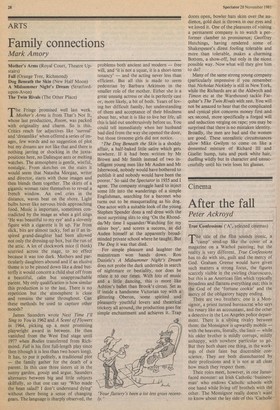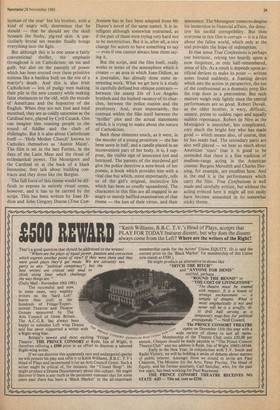Cinema
After the fall
Peter Ackroyd
True Confessions ('A', selected cinemas) The title of the film sounds ironic, a 'camp' send-up like the cover of a magazine on a Warhol painting; but the reality is very different. True Confessions has to do with sin, guilt and the mercy of God. Graham Greene would have given such matters a strong focus, the figures scarcely visible in the swirling chiaroscuro, but this is an American film which typically broadens and flattens everything out; this is the God of the 'fortune cookie' and the mercy of the obligatory happy ending.
There are two brothers: one is a Monsignor, a priest turned bureaucrat who says his rosary like an accountant, and the other a detective in the Los Angeles police department. There is a sibling rivalry between them: the Monsignor is upwardly mobile — with the heavens, literally, the limit — while his older brother is mildly corrupt, mildly unhappy, with nowhere particular to go. But they both share one thing, in the workings of their faint but discernible conscience. They are both disenchanted by their professions and it is not at all clear how much they respect them.
Their roles meet, however, in one Janusfaced monster: an Irish Catholic 'businessman' who endows Catholic schools with one hand while living off brothels with the other. The Monsignor really doesn't want to know about the lay side of this 'Catholic layman of the year' but his brother, with a kind of angry will, determines that he should — that he should see the skull beneath the fleshy, pig-red skin. A particularly brutal sex murder finally brings everything into the light.
But although this is in one sense a fairly conventional thriller, the emphasis throughout is on Catholicism: on sin and guilt, but also on the panoply of power which has been erected over these primitive notions like a basilica built on the site of a martyr's death. And this is also Irish Catholicism — lots of pudgy men making their pile in the new country while making faint obeisances to the old, with the morals of Americans and the hypocrisy of the English. When they are not foul and loud mouthed, they are as coldly saturnine as the Cardinal here, played by Cyril Cusack. One can imagine him roasting people to the sound of fiddles and the clash of shillelaghs. But it is also about Catholicism itself — 'Holy Mother Church' known to Catholics themselves as 'Auntie Maim'. The film is set in the late Forties, in the days of the Latin Mass and the ritual of ecclesiastical power. The Monsignor and the Cardinal sit at the back of a black limousine; they talk about building contracts and they dress like the Borgias.
The full force of this theme would be difficult to express in entirely visual terms, however, and it has to be carried by the script. This has been written by Joan Didion and John Gregory Dunne (True Con fessions has in fact been adapted from Mr Dunne's novel of the same name). It is intelligent although somewhat restrained, as if the pair of them were trying very hard not to be meretricious. But it is, after all,a nice change for actors to have something to say — even if one cannot always hear them saying it.
But the script, and the film itself, really works in terms of the atmosphere which it creates — an area in which Joan Didion, as a journalist, has already done some interesting work. What we get here is a study in carefully defined but oblique contrasts — between the seamy life of Los Angeles brothels and the hushed vacancy of its churches, between the police station and the presbytery. And, most importantly, the contrast within the film itself between the 'thriller' plot and the actual statements which it is trying to make about the nature of Catholicism.
Both these elements touch, as it were, in the murder of a young prostitute — she has been sawn in half, and a candle placed in an inconvenient part of her body. It is, I suppose, the visible sign of innocence lost and betrayed. The parents of the murdered girl give the police detective a note-book of her poems, a book which provides him with a vital clue but which, more importantly, tells us of the girl's original, instinctive life which has been so cruelly squandered. The characters in this film are all engaged in an angry or merely baffled examination of that theme — the loss of their virtue, and their innocence. The Monsignor comes to despise his immersion in financial affairs, the detective his sordid corruptibility. But then everyone in this film is corrupt — it is a film about the fallen world, which only at the end provides the hope of redemption.
In that sense True Confessions is perhaps too histrionic, relying too heavily upon a now forgotten, or only half-remembered, sense of life. As a result it depends upon artificial devices to make its point — written notes found suddenly, a framing device which sets the action in perspective, the use of the confessional as a dramatic prop like the trap door in a pantomime. But such matters weigh only lightly since the central performances are so good. Robert Duvall, as the older brother, is wary, difficult, uneasy, prone to sudden rages and equally sudden repentance. Robert de Niro as the Monsignor is smoother, less complicated, very much the bright boy who has made good — which means also, of course, that he has made bad. The secondary parts are also well played — we hear so much about American 'stars' that it is good to be reminded that there is a fine tradition of medium-range acting in the American cinema: Burgess Meredith and Charles Durning, for example, are excellent here. And in the end it is the performances which carry the film. True Confessions is well made and carefully written, but without the acting evinced here it might all too easily have become enmeshed in its somewhat sticky theme.















































 Previous page
Previous page